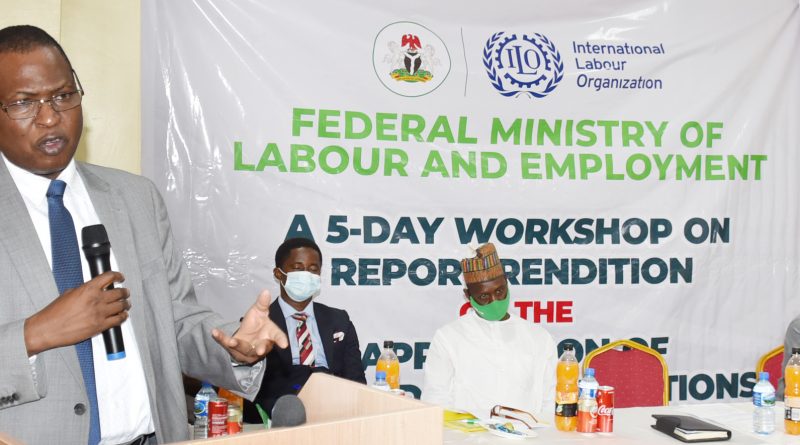EFFECTIVE IMPLEMENTATION/REPORTING OF ILO STANDARDS VITAL FOR LABOUR ADMINISTRATION – TARFA
Oru Leonard
Permanent Secretary, Federal Ministry of Labour and Employment, Dr Yerima Tarfa, has said that proper implementation and reporting of International Labour standards would aid in maintaining an effective Labour administration in the country.
Tarfa stated this at the commencement of a five-day Workshop on Report Rendition on the Application of Ratified Conventions and Recommendations of the International Labour Organization (ILO), for officers of the Ministry and other stakeholders in the Labour sector.
The workshop is aimed at developing and strengthening the capacity of focal persons within the Ministry, Departments and Agencies, and Social Partners to effectively report on ILO Ratified Conventions.
The Permanent Secretary said the workshop was convened because of “Nigeria’s commitment to fulfilling its obligations as a Member State of the ILO and ensuring best practice to Labour Administration in line with international standards.”
He stated that the workshop was in fulfillment of Article 22 of the ILO Constitution which provides that “each of the Member State agrees to make an annual Report to the International Labour Office on the measures taken to give effect to the provisions of Conventions to which it is a party.”
Tarfa added that member States are also obliged to submit biennial reports detailing steps taken, in law and practice, to apply any of the eight Fundamental and four Priority Conventions they may have ratified. “In the case of all other conventions, reports must be submitted every five years, except for conventions that have been ‘shelved’.”
He restated Government’s commitment to promoting healthy working conditions for Nigerian workers in line with International Labour Standards.
Tarfa noted that Government appreciates the critical role played by a stable and harmonious industrial relations, as well as decent work for all, in the realization of “the goals and targets of the 2030 Sustainable Development Goals (SDG).”
He urged the participants to render their report using the Report Form provided by the Governing Body of the International Labour Office, as the Report Form had been drawn up in such a manner as to facilitate the supply of the required information on “the peculiarities and difficulties experienced in the application and implementation of Conventions and Recommendations.”
The Permanent Secretary said that the participants would also be required to provide detailed information to bridge the various gaps which the Committee of Experts on the Application of Conventions and Recommendations (CEACR), has observed on previous submitted reports, among other tasks.

right), Productivity Measurement and Labour Standard, Mr Eyewumi Neburago, in a group photograph with the participants at a 5 day workshop on Report Rendition on the Application of Ratified Conventions in Abuja
Tarfa urged the participants to be diligent in the task ahead, as the responses they would compile would go a long way in charting the way forward with regards to current and emergent trends in the world of work occasioned by COVID-19, as well as globalisation.
He disclosed that in 2018, 2019 and early 2020, Nigeria was able to clear up the backlog of reports on Ratified and Unratified Conventions within the specified time, but on account of the COVID-19 pandemic, it could not submit “this Report on Ratified Conventions which was due for submission between 1st June and 1st September 2020.”
Earlier, Director, Productivity Measurement and Labour Standards, Daniel Neburagho, said “the Report generated from the ratified and unratified Conventions and Recommendations will enable CEACR to prepare a General Survey that will reveal the gap in national laws and practices.”
According to him, the survey would also “provide information that will serve as a basis for technical cooperation and assistance in bridging identified gaps and challenges, and thereby improving our Labour Administration system and enhancing decent work in the country.”
He said that at the end of the workshop, participants would have acquired a general knowledge of the ILO ratified and unratified Conventions and Recommendations, as well as a solid grasp of the technicalities required for ILO Report Writing.




